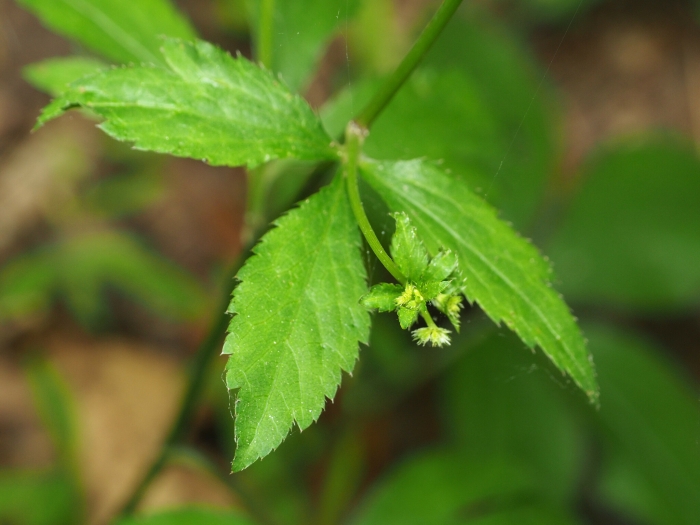Blisterwort
(Ranunculus recurvatus)
Blisterwort (Ranunculus recurvatus)
/
/

© Katja Schulz
CC BY 4.0
Image By:
© Katja Schulz
Recorded By:
Copyright:
CC BY 4.0
Copyright Notice:
Photo by: © Katja Schulz | License Type: CC BY 4.0 | License URL: http://creativecommons.org/licenses/by/4.0/ | Uploader: treegrow | Publisher: iNaturalist |






















Estimated Native Range
Summary
Ranunculus recurvatus, commonly known as Blisterwort or Hooked Crowfoot, is an herbaceous perennial native to moist deciduous forests and floodplain woods in eastern North America, ranging from central Quebec to Florida. It typically grows 1-2 feet tall and features a basal rosette of leaves with branched stems bearing alternate leaves. Basal leaves can reach up to 5 inches in length and width, with long hairy petioles, while the alternate leaves are smaller and more slender. Both types of leaves have crenate or dentate margins. The stems are light green, terete, and covered with long hairs. Blisterwort produces small, yellow flowers with five petals that bloom early in the spring, and although not particularly showy, they add a subtle charm to woodland settings.
Blisterwort is valued for its ability to thrive in shady, moist environments, making it suitable for woodland gardens and naturalized areas. It prefers consistently moist soil and partial to full shade, mimicking its native habitat conditions. While not commonly used in formal garden settings, it can be an interesting addition to native plant gardens or restoration projects. Gardeners should be aware that it can spread via seeds and rhizomes, potentially becoming aggressive in ideal conditions. It is not known for significant pest or disease problems, but care should be taken to avoid overly wet conditions that could lead to root rot.CC BY-SA 4.0
Blisterwort is valued for its ability to thrive in shady, moist environments, making it suitable for woodland gardens and naturalized areas. It prefers consistently moist soil and partial to full shade, mimicking its native habitat conditions. While not commonly used in formal garden settings, it can be an interesting addition to native plant gardens or restoration projects. Gardeners should be aware that it can spread via seeds and rhizomes, potentially becoming aggressive in ideal conditions. It is not known for significant pest or disease problems, but care should be taken to avoid overly wet conditions that could lead to root rot.CC BY-SA 4.0
Plant Description
- Plant Type: Herb
- Height: 1-2 feet
- Width: 0.5-1 feet
- Growth Rate: Moderate
- Flower Color: Yellow
- Flowering Season: Spring, Summer
- Leaf Retention: Deciduous
Growth Requirements
- Sun: Full Sun, Part Shade
- Water: Medium
- Drainage: Medium
Common Uses
Bird Garden, Low Maintenance, Water Garden
Natural Habitat
Moist deciduous forests and floodplain woods in eastern North America
Other Names
Common Names: Hooked Crowfoot, Littleleaf Buttercup, Hooked Buttercup, Little-Leaved Buttercup, Rough Buttercup
Scientific Names: , Ranunculus recurvatus, Ranunculus fascicularis, Ranunculus hirtus, Ranunculus hirtus, Ranunculus lanuginosus, Ranunculus leptopetalus, Ranunculus recurvatus f. laevicaulis, Ranunculus recurvatus f. laevicaulis, Ranunculus recurvatus f. recurvatus
GBIF Accepted Name: